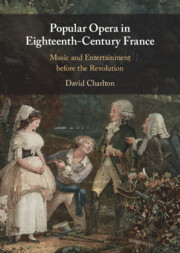Book contents
- Popular Opera in Eighteenth-Century France
- Popular Opera in Eighteenth-Century France
- Copyright page
- Dedication
- Epigraph
- Contents
- Illustrations
- Tables
- Examples
- Preface
- Acknowledgements
- Notes on the Text
- Abbreviations
- 1 Introduction
- 2 Music and Spoken Theatre
- 3 Music in Gherardi’s Company
- 4 Singing and Acting at Home
- 5 Opéra-comique en vaudevilles
- 6 Experiences of Popular Theatre
- 7 Comic and Serious Themes
- 8 Performance as History
- 9 Musical Expansion
- 10 Italian Inroads: The King’s Company
- 11 Six Methods of Synthesis
- 12 A ‘Musico-Dramatic Art’
- 13 Conclusions
- Stage Works Cited
- Bibliography
- Index
10 - Italian Inroads: The King’s Company
Published online by Cambridge University Press: 09 December 2021
- Popular Opera in Eighteenth-Century France
- Popular Opera in Eighteenth-Century France
- Copyright page
- Dedication
- Epigraph
- Contents
- Illustrations
- Tables
- Examples
- Preface
- Acknowledgements
- Notes on the Text
- Abbreviations
- 1 Introduction
- 2 Music and Spoken Theatre
- 3 Music in Gherardi’s Company
- 4 Singing and Acting at Home
- 5 Opéra-comique en vaudevilles
- 6 Experiences of Popular Theatre
- 7 Comic and Serious Themes
- 8 Performance as History
- 9 Musical Expansion
- 10 Italian Inroads: The King’s Company
- 11 Six Methods of Synthesis
- 12 A ‘Musico-Dramatic Art’
- 13 Conclusions
- Stage Works Cited
- Bibliography
- Index
Summary
Chapter 10 explains many ways in which Italian music in particular was cultivated at the new Comédie-Italienne from 1716, directed by Luigi Riccoboni. Arias in Italian by Mouret contributed to divertissements of plays. Research into the company’s principal singers introduces an account of Le Joueur, written in-house as a response to Giuseppe Orlandini’s Serpilla e Baiocco at the Opéra in 1729. An edition of Le Joueur specially made for this book is referred to, accessible from its online space. Evidence then shows that different French singers were influenced by performing Italian, or Italianate, music: Pierre Théveneau, Charles Rochard, Joseph Caillot. ‘Il soldato valoroso’ focuses on a descriptive aria by Mouret (1729) presaging comic narratives in the French repertory. ‘Towards La Servante maîtresse’ explains the special nature of the 1746 performances of Pergolesi’s La serva padrona, then discusses French acting skills in relation to the requirements of Italian musical comedy. The repertory of Eustachio Bambini’s visiting troupe at the Opéra (1752–54) is discussed in relation to French cultural experience. The early career of Marie-Justine Favart is described, and her singing. French experience of intermezzi is assessed using a 1954 recording of Il maestro de musica, sung and spoken in German.
- Type
- Chapter
- Information
- Popular Opera in Eighteenth-Century FranceMusic and Entertainment before the Revolution, pp. 236 - 261Publisher: Cambridge University PressPrint publication year: 2021



